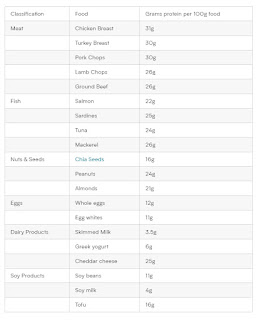Protein is one of your body's basic building blocks, and it's utilized to repair and maintain all of your body's tissues, including muscle.
If you want to gain muscle, you'll need the proper quantity of protein, as well as the right proportions of the other macronutrients, such as carbohydrates and fats.
The usual rule of thumb for calculating the minimal quantity of protein required is 0.36 grams per pound of body weight. That's around 60 grams of protein per day for a 165-pound adult.
But that’s just the minimum recommended daily allowance (RDA).
You might be wondering if the suggested minimum amount of protein is sufficient to help you gain muscle. We'll look at how much protein you should eat per day to grow muscle in the sections below (and even pinpoint the amount of protein needed to also burn fat and lose weight in the process).
How Much Protein Do You Need to Build Muscle?
Let's dig deeper into the specifics based on your sex and body type now that you know the basic range of protein required to create muscle. These are estimations that change depending on your age and exercise level.
How to calculate your protein requirements for muscle mass
The basic rule for determining the minimal quantity of protein required is 0.36 grams per pound of body weight or 0.8 grams per kilogram of body weight. Healthy adults have a range of 0.8-1 gram per kilogram, while the elderly have a range of 1-1.2 grams per kilogram. According to that formula, a 150-pound person needs 54 grams of protein each day. People can also determine their protein needs by allocating a percentage of their total daily calories to the three macronutrients. The usual rule of thumb is to get 10 to 25 percent of your total calories from healthy protein sources.
It's vital to note that this estimate excludes any other variables like exercise level or muscle-building objectives. If you want to gain muscle, sticking to the upper end (i.e., 25 percent of your calories from protein versus only 10 percent) or calculating protein based on your weight is a good option. Consult a nutritionist for the best results, or continue reading to learn how to calculate a good daily protein intake for people looking to gain muscle.
Is 100 grams of protein enough to build muscle?
As previously stated, persons should consume at least 0.36 grams of protein per pound of body weight or 0.8 grams of protein per kilogram of body weight per day, but those that emphasize muscle building should aim for more. Although there is no magic amount and guidelines vary by person, athletes should consume 1.2 to 2.0 grams of protein per kilogram of body weight, according to the American College of Sports Medicine. Bodybuilders and those wanting to grow muscle or retain lean body mass may benefit from ingesting closer to 1.6 to 2.0 grams of protein per kilogram of body weight, according to that general guideline. 75-120 grams of protein per day for a 150-pound adult who is actively doing strength or resistance exercise, with 100 grams being the sweet spot for most people. Muscle protein synthesis (the naturally occurring process in which protein is created to repair muscle damage caused by intensive exercise and the opposing force to muscle protein breakdown) is optimal in young adults at a dose of 20–25 grams of high-quality protein.
That may sound like a lot, but if you consume protein with each meal and a few protein-rich snacks throughout the day, you can do it. Protein turnover, the process by which your body consumes protein to generate lean tissue, rises when you strength train, so spreading out your protein intake throughout the day is especially crucial if you're strength training. According to a 2012 study published in the Brazilian Journal of Medical and Biological Research, athletes don't achieve nitrogen balance (the difference between protein intake and protein degradation) until their protein intake reaches 1.2 grams per kilogram per day, compared to 0.8 grams per kilogram per day in resting individuals.
You may be concerned that consuming too much protein is hazardous for your kidneys, but for healthy adults, 100 grams of protein per day is normally harmless. If a person already has renal problems, taking a lot of protein can be damaging to their kidneys; however, consuming roughly 2.2 grams of protein per kilogram is fine for healthy people, according to a 2010 study published in the peer-reviewed journal Medicine & Science in Sports & Exercise.
Can I build muscle with just protein?
Ingesting 20 to 40 grams of protein around the time of a workout has been found to improve the body's ability to recover after exercise, but muscle growth requires more than simply protein. If your goal is to build muscle, you'll need to consume more calories to help drive that growth, but those calories shouldn't all come from protein. If you want to gain muscle mass, you should put more emphasis on carbohydrate consumption than if you only want to lose weight.
Protein should account for 25% of your total calories while you're trying to gain muscle through exercise. As a result, your macronutrient breakdown is roughly 25% protein, 45-60% carbohydrate, and 20-30% fat. If you want to consume 100 grams of protein per day, aim for 25 grams of protein per meal, whether you eat four meals per day or three meals per day with two 12.5-grams-protein-per-snack snacks.
High-protein foods to help you build muscle
The table below compares the amount of protein in several high–protein foods based on a 100g serving. 2 However, keep in mind that the serving size for each of these meals is not always 100g.
While the cost of chia seeds per 100g is considerable, you're unlikely to consume more than 10g at a time, but you might consume more than 100g of milk.





.jpg)



0 Comments